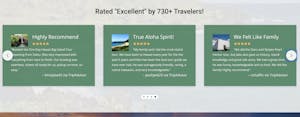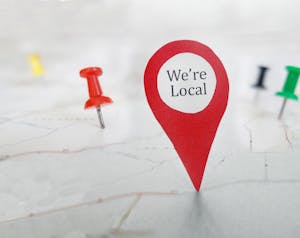- 6 minutes
- Reputation Management
- SEO
You Asked, We Answered: Review FAQS (That You’ll Actually Use!)
Beginner,
Intermediate
Join hundreds of other operators and REGISTER NOW for Spark 2024 New Orleans October 13-15th!

Thanks to review websites like Yelp, Tripadvisor, and even Facebook business pages, a company’s online reputation can make or break a consumer’s decision to book a tour or activity.
With smartphones always at our fingertips, it’s not uncommon for tour and activity participants to document every moment of their travel experience and post it online for future customers to see. Whether it’s boasting about the amazing food tour they just took or lamenting the issues experienced during a sunset trail ride, customer reviews significantly impact a company’s online reputation.
According to BrightLocal, 86% of consumers read reviews for local businesses, and 91% of 18-34-year-olds trust online reviews as much as personal recommendations, making your online reputation more important than ever. A positive reputation, garnered by good reviews, can create a sense of trust, convert searchers into paying customers, and even boost local search rankings.
By opening up a channel of feedback between your business and your customers, you can build an online reputation, improve organic SEO, and even learn a thing or two about how to run your business (and what changes to make to retain happy customers — and attract new ones!).
The first step to building a positive online reputation is understanding why customer reviews are so important and how businesses benefit from them online. By the end of this guide, you’ll be ready to move onto the next steps: asking for and responding to reviews!
From generating trust in a brand to improving a site’s SEO, curating reviews, and maintaining an online reputation is one of the most essential marketing tactics for tourism businesses. In fact, having a strong online reputation has measurable results! Check out some of our favorite stats about the hidden powers of online reviews:![]()
Most people who book a tour or activity online conduct research to help determine if the experience is worthwhile and the company is reliable. This often starts with reading online reviews.
Understandably, if reviews are mostly negative, customers probably are unlikely to book an activity with that company. On the flip side, good reviews create a sense of trust for potential customers. People tend to trust their peers over professionals, and chances are, people who participate in the same activity have similar interests and can provide a similar perspective on the tour.
 Pro tip: Put positive online reviews to work for you by posting them on your website to show potential customers they can trust your business since other people have enjoyed the experiences you offer.
Pro tip: Put positive online reviews to work for you by posting them on your website to show potential customers they can trust your business since other people have enjoyed the experiences you offer.

Once a potential customer discovers a business online, it’s time to make a decision on which activity to book. Your website may be well-laid out and informative, but ultimately customer reviews help to drive those final bookings decisions. Reviews offer additional information and new insights about the experience that prompt customers to book, and often answer common questions such as:
Generating trust in a business is the first step toward someone making a booking, and once customers see that others have participated in your company’s tours or activities, they’re more likely to click that book button. Social proof, like reviews, drives purchases. In fact, the purchase likelihood for a product with five reviews is 270% greater than a product with 0 reviews (BrightLocal).
If you really want to generate leads, having a good star rating is everything.
For tips and tricks on how you can boost your star rating, check out this guide on how to respond to reviews.

The best way to approach negative reviews is to think of them as constructive criticism or feedback. It’s totally normal to be upset about receiving a bad review, but it actually opens up new opportunities for growth.
Both negative and positive reviews can help educate on what your business does well and how it can improve. Did a cruise guest get upset by a lack of vegetarian options on the menu? Take that information as advice to rework a menu, as there are likely other vegetarians who may have the same feedback. Did a walking tour guest compliment how upbeat and friendly the tour guide was? Share these comments with employees so they know what they’re doing right and can continue to do so on future tours.
Feedback, whether positive or negative, is one of the most valuable growth and insight tools in your arsenal, and gaining online reviews is one of the easiest ways to solicit feedback. If you look at each new review as additional information about your services, you can continue to grow, change, and adapt, ultimately setting your business up for success.
Just as customers care about online reviews, Google pays attention to them as well, as they help the search engine better understand your site. Travelers have become accustomed to reading reviews prior to booking a tour or activity, and Google now expects businesses to have ratings and reviews.
Between more and more competitor websites emerging each day and paid marketing becoming less effective in saturated markets, ranking well in organic search results is a huge win for tourism companies, and online reviews can give a huge rankings boost.
Since paid advertising campaigns don’t always please viewers, focusing efforts on improving organic ranking is good for both your business and your customers. Ranking on the first page of the SERPs certainly doesn’t happen overnight, but there are many ways to improve SEO strategy (see some of our favorite SEO tips). Reviews and ratings are one aspect of a marketing strategy that can do double duty to boost organic SEO.
Building a presence on third-party review platforms signals to Google that you’re not just any website, but an established brand with a collection of reviews and ratings from customers. Google, like customers, prefers trustworthy and up-to-date information, and reviews help it gain a deeper understanding of who your business is and what it does. This helps the search engine derive brand signals, boosting your site’s domain authority and even its position on the SERP.

Online reviews really become impactful within local markets, especially on Google’s Local Pack, the section on the SERP that displays businesses relevant to the searcher’s location.
According to a 2018 study from Whitespark, reviews accounted for more than 15% of how Google ranked a local business. As you can see in the above search, for businesses listed in the Local Pack, results include the company’s star rating. According to Podium, Google automatically filters out local businesses with less than a 4-star rating, making your online reputation more important than ever if you’re hoping to land a spot in the Local Pack. Furthermore, review ratings are the biggest driver of clicks in local SERPs (BrightLocal).
Reviews from Google My Business (GMB) are especially worth paying attention to (for a full overview of what GMB is and why you need it, check out our GMB guide). Google is the number one site for rankings and reviews in terms of volume, so reviews on GMB can go a long way.
Reviews that contain keywords are the second biggest factor for determining where a local business is displayed in the Local Pack. If any of the GMB reviews mention keywords a company is trying to rank for as well as the city or neighborhood the business is located in, there is a much greater chance of ranking.
Update and optimize your GMB profile with this easy checklist.
Engaging with customers online – whether that be on social media, your GMB page, or elsewhere – is critical to building brand trust. Not only do customers want to see responses to review, Google does as well. GMB has a support page dedicated to improving ranking on Google, and one of its recommendations is that businesses respond to reviews, hinting that responses may even affect SEO rankings.

If you’re a relatively new business or are worried you don’t have enough online reviews, there are several steps to take to increase the number of reviews you receive and boost your star rating by responding to reviews, both positive and negative.
In the next review guides, we go over how to ask your customers for reviews and how to manage any negative reviews you might receive. Engaging with customers, whether their feedback was negative or positive, paints you as a responsible and dedicated business owner, making your business stand out and helping retain happy customers.